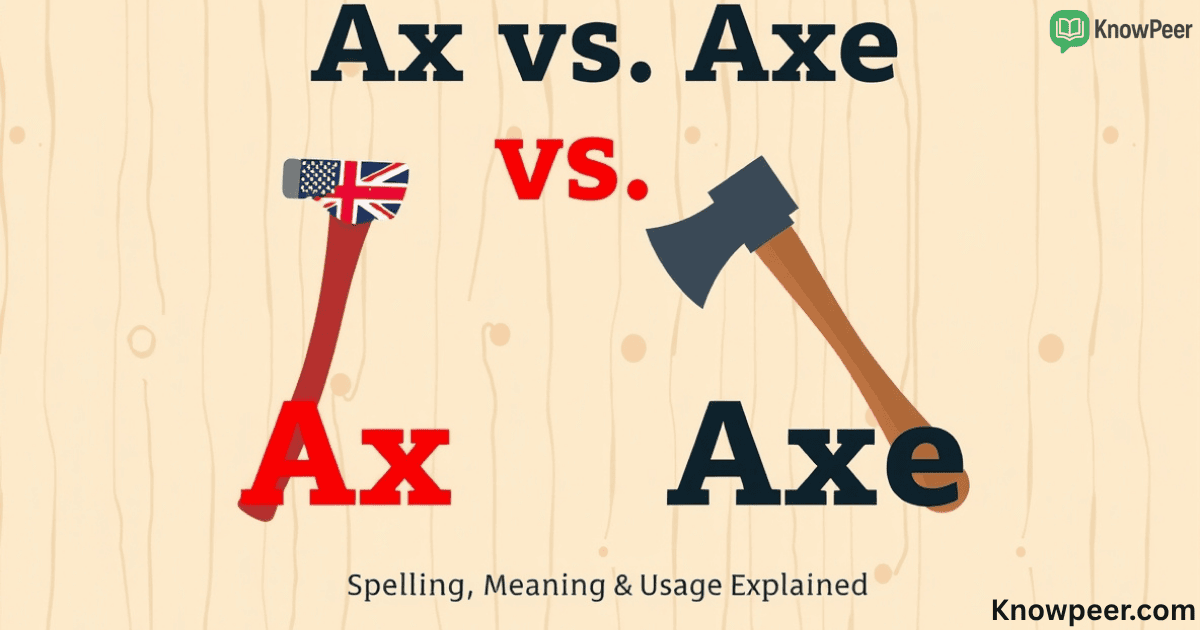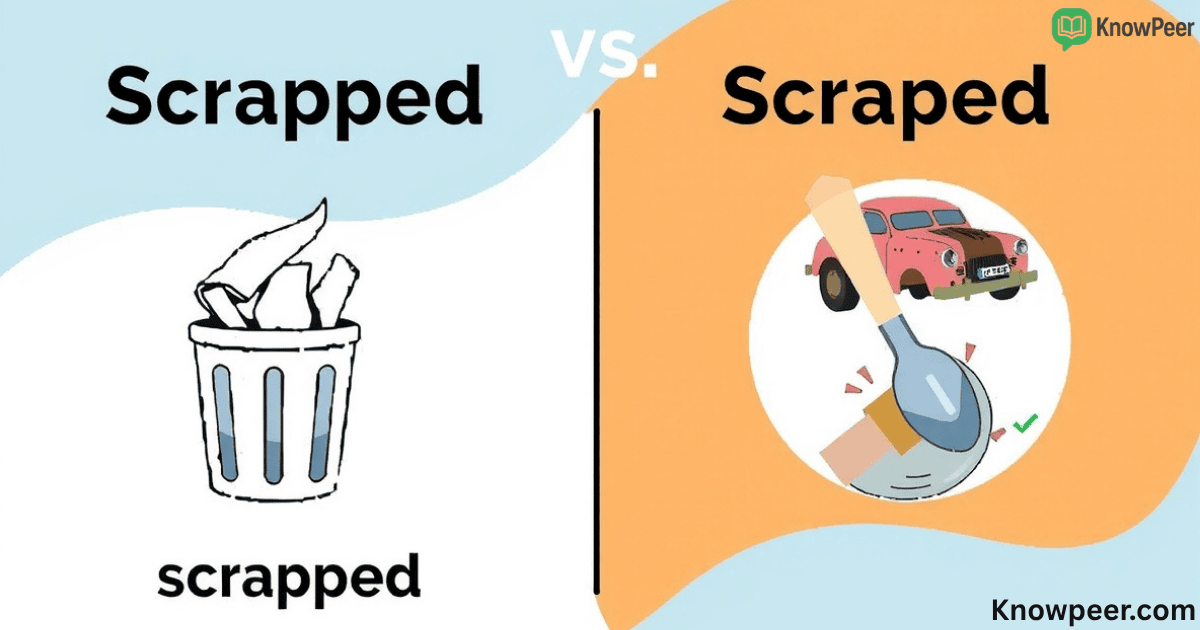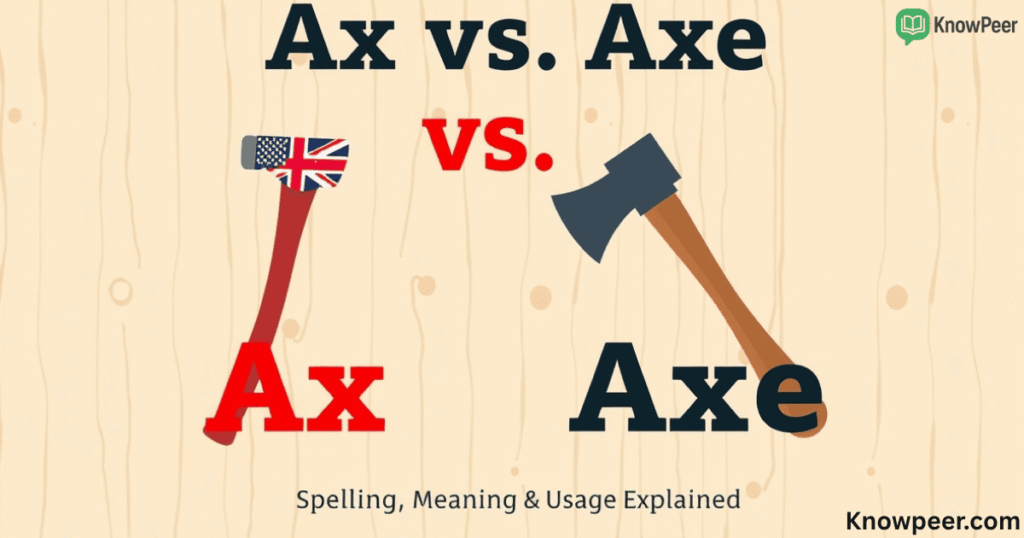Language is full of small twists that make writing interesting—and sometimes confusing. One of those tricky cases is the spelling ax vs axe. You’ve likely seen both, maybe even used them without realizing it. They look alike, sound the same, and mean the same thing. So why do both exist? The answer lies in history, geography, and how English has evolved over time. In this article, you’ll discover the real difference between ax and axe, the story behind each spelling, and which one you should use depending on your audience or region.
The Historical Roots of “Ax” and “Axe”
The history of the word axe begins deep in the past, long before dictionaries existed. The term comes from Old English æx, an ancient word that referred to the same tool used for chopping wood we recognize today. Back then, English had many regional variations because there was no standard spelling system. As people wrote words based on how they sounded, æx slowly evolved into different forms, including “ax” and “axe.”
By the 14th century, “axe” was more common in British writing, appearing in medieval manuscripts and early printed books. When American spelling began to separate from British standards, language reformers wanted to simplify words by removing unnecessary letters. Noah Webster, the man behind the first American dictionary, argued that shorter spellings made reading and printing easier. That’s how ax vs axe spelling began to diverge—“ax” became the American standard, while “axe” stayed popular in British English. This shift wasn’t random. It reflected a national effort in the U.S. to make English leaner and more logical.
Even so, “axe” never disappeared in America. Literature from the 18th and 19th centuries shows both forms being used interchangeably. The early printers and typesetters didn’t always follow strict spelling rules, so both spellings survived side by side. Over time, dictionaries reinforced the difference—Merriam-Webster preferred “ax”, while the Oxford English Dictionary held onto “axe.” That small detail explains much of today’s confusion.
Modern Usage—Who Uses “Ax” and Who Uses “Axe”?
When you compare ax vs axe usage, you’ll notice a clear regional pattern. In American English, “ax” is considered the standard form, while British English continues to prefer “axe.” This isn’t a random preference; it reflects deep cultural and linguistic traditions. In the U.S., people generally write “ax” whether they’re talking about a tool used for chopping wood, an expression like “get the ax”, or even a digital metaphor like “to ax a project.” Meanwhile, in the U.K., “axe” dominates everything from newspapers to textbooks.
Linguistic data backs this up. If you search through Google Ngram, a tool that tracks word usage across books, you’ll see that “axe” leads strongly in British texts, while “ax” is far ahead in American ones. The same trend appears in online writing tools. Grammarly, for example, automatically changes “axe” to “ax” when your settings are set to American English, but it does the opposite when set to British English. The ax vs axe meaning doesn’t change at all—it’s purely a matter of spelling and audience.
Interestingly, there’s no difference in ax and axe pronunciation. Both are said the same way, with a short “a” sound and a sharp “ks” ending. This identical pronunciation is part of what makes ax vs axe in writing confusing to learners of English. But the general rule is simple: use “ax” for American readers, and “axe” for British or international ones.
Are There Situations Where One Spelling Is Preferred?

The question “ax or axe which is correct” depends on where and how you’re writing. If you’re following American English style guides such as APA or Chicago, “ax” is your best choice. But if your writing is for British English, like Oxford or Cambridge style, then “axe” is correct. The difference isn’t about meaning—it’s about convention and consistency.
There’s also a cultural twist. In informal American slang, “ax” has a broader life. You’ve probably heard someone say “I’m going to ask you a question.” That’s not a typo—it’s a common pronunciation variant that’s been part of spoken English for centuries. Similarly, “ax” appears in idioms like “get the ax,” meaning someone got fired. On the other hand, “axe” often carries a more formal or traditional tone. For instance, when referring to the tool used for chopping wood, many writers instinctively choose “axe” because it feels older or more rustic.
You’ll also see brand and pop culture examples that choose one form deliberately. The well-known men’s grooming brand Axe Body Spray uses the British spelling even in the U.S., giving it a sleek, international feel. This shows how spelling can also carry a stylistic or marketing choice beyond grammar.
Case Study: Dictionaries and Regional Preferences
To illustrate the difference between ax and axe, let’s look at how major dictionaries treat each one.
| Dictionary | Region | Preferred Spelling | Notes |
| Merriam-Webster | U.S. | Ax | Lists “axe” as a variant |
| Oxford English Dictionary | U.K. | Axe | Recognizes “ax” as American |
| Cambridge Dictionary | U.K. | Axe | “Ax” marked as U.S. English |
| Collins Dictionary | U.K. | Axe | Notes that “ax” is American |
| Dictionary.com | U.S. | Ax | Uses “axe” as secondary form |
This small table highlights how regional spelling differences show up even in reference books. Both spellings are correct according to their own linguistic traditions, but it’s best to match your spelling to your audience’s expectations.
Common Idioms and Phrases Using “Axe” or “Ax”
Many idioms in English feature this word, which adds another layer to ax vs axe grammar. The most popular one, “to have an axe to grind,” means someone has a personal motive or bias in a situation. Another is “to get the axe,” meaning to be dismissed or cut off. There’s also “bury the axe,” which refers to making peace after a conflict. These phrases usually use “axe,” regardless of region, because idioms tend to preserve their traditional spelling.
For instance, in American writing, a journalist might write, “Three employees got the ax today.” In contrast, a British newspaper would likely say, “Three workers got the axe.” Both convey the same meaning but follow their own spelling customs. So while idioms bridge both forms, your chosen spelling still aligns with your regional or stylistic norm.
It’s fascinating how these expressions carry deep cultural meaning. The axe definition and usage has expanded far beyond the literal chopping tool. In business, media, and everyday talk, “ax” or “axe” symbolizes decisive action—cutting away something unnecessary or outdated. This metaphorical strength explains why the word remains powerful in both spellings.
How to Decide Which One to Use
If you’re wondering how to make the right choice between ax vs axe, the answer lies in your audience and consistency. English allows flexibility, but professional writing demands clarity. The simplest way to decide is to match your spelling with your reader’s region. American audiences expect “ax,” while British, Australian, or Canadian readers prefer “axe.” If you’re writing for a global audience, “axe” tends to look more formal and internationally accepted.
Consistency matters most. Switching between “ax” and “axe” in the same piece can look careless. Whether you’re writing a research paper, a blog post, or product descriptions, pick one spelling and stick with it. You can also check your word processor’s language setting—Microsoft Word and Google Docs automatically adjust based on your selected English version.
| Region | Preferred Spelling | Example |
| United States | Ax | “He swung the ax and split the log.” |
| United Kingdom | Axe | “He lifted the axe and chopped the wood.” |
| Canada | Ax (common), Axe (also accepted) | “She used an ax to cut firewood.” |
| Australia | Axe | “They used an axe to build the cabin.” |
When in doubt, think of other American vs British spelling examples like color/colour or center/centre. Just like those, ax vs axe spelling is a reflection of linguistic evolution rather than a difference in meaning.
Fun Linguistic Facts About “Ax” and “Axe”

There’s more to the story of ax vs axe difference than simple spelling. Linguists often use this example to explain how English adapts naturally over time. Words like “ax” show the American tendency toward simplicity—cutting away letters that don’t affect pronunciation. British English, meanwhile, keeps the traditional forms, valuing historical continuity. Both approaches are valid and together they make English rich and flexible.
Pronunciation has stayed consistent for centuries. Whether you say ax or axe, the sound hasn’t changed much since Middle English. That stability is unusual, considering how many English words have evolved in both spelling and sound. This constancy proves how durable the word is, just like the sturdy tool it describes.
Another interesting note is that the word history and origin of “axe” appear in several other languages. German has “Axt,” Dutch uses “bijl,” and Swedish says “yxa.” These linguistic cousins show how far back the word goes, connecting modern English to its ancient Germanic roots. The linguistic differences in English today are really just echoes of those ancient branches.
Even in modern slang, “ax” keeps finding new meanings. In tech culture, people “ax” programs, projects, or features that don’t work. In music, “axe” is a popular term for an electric guitar, adding flair to its sound. Whether it’s digital, musical, or mechanical, both spellings keep evolving with culture. That adaptability is what makes language so fascinating.
Language Rules and Consistency Matter
In the end, there’s no absolute winner in the axe vs ax difference. Both forms are correct, and both have deep historical roots. The real issue is language consistency in writing. When readers see consistent spelling, they trust your content more. Mixing forms can make text look rushed or uncertain. Style guides across the world—whether American or British—stress this same rule.
That’s why learning the grammar and spelling rules behind these small differences matters. It’s not just about memorizing which one to use; it’s about understanding how words reflect culture and history. The spelling variations between US and UK English remind us that language isn’t fixed—it grows and changes with people. By mastering small details like ax vs axe American English and axe vs ax British English, you strengthen your writing voice and credibility.
Conclusion
So, ax vs axe isn’t really a battle at all. It’s a story about how two spellings traveled through time, shaped by geography and culture. Both are right, both are real, and both mean the same thing—a sharp-edged tool used for chopping wood and a symbol of decisive action. Whether you choose “ax” or “axe,” your goal is clear communication.
The next time you wonder “ax or axe which is correct,” remember that your readers’ location determines your choice. Use “ax” in the U.S., “axe” in the U.K., and never mix them in the same piece. That small act of precision shows respect for your audience and your craft. Words, like tools, work best when used the right way—and that’s the real power behind the difference between ax and axe.











